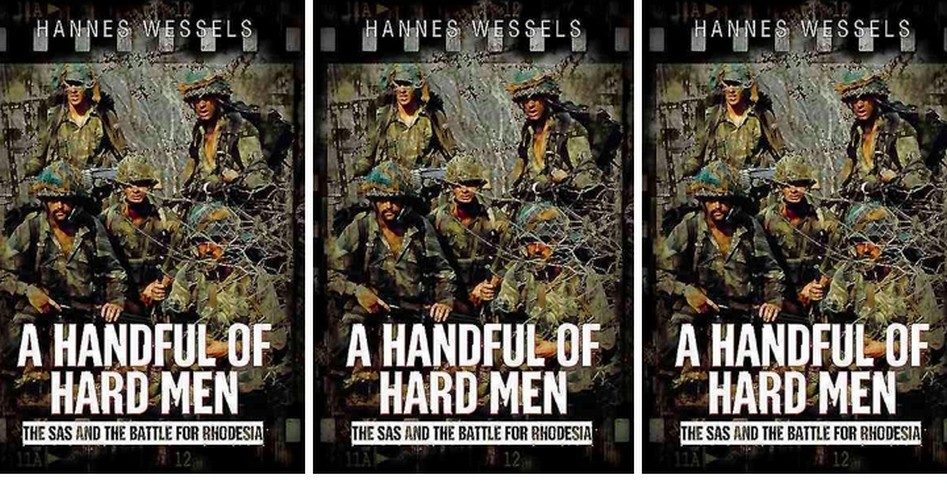
In his most recent book, A Handful of Hard Men: The SAS and the Battle for Rhodesia, Hannes Wessels recounts the engaging history of an elite force of fighting men waging war on behalf of a seemingly-doomed cause. The history of the Special Air Service (SAS) provides Wessels an opportunity to provide a human face to what many Americans and Europeans ignored at the time as a struggle for a distant corner of the globe.
The battle for Rhodesia and for South Africa was inextricable from the larger context of the struggle between the Soviet bloc and the West. While the Marxists never forgot the larger context for each regional conflict, the United States and its European allies made a regular practice of abandoning their friends and betraying their allies in Asia and Africa. As Wessels explains, the battle for southern Africa was a crucial aspect of the overall conflict:
The proxy war for the world was on and southern Africa, particularly South Africa, possessing enormous mineral and strategic value, was firmly in Sino-Soviet sights. But a primary obstacle was Rhodesia, so it should come as no surprise that Moscow and Beijing supported the ‘liberation’ movements energetically and generously. It was into this vortex that the Rhodesian soldier was thrown and so it begs the question: what if they had chosen not to fight and capitulated in the mid-1960s as the world demanded they do? Stalinist-type rule would almost certainly have followed and powerful direct economic, political and military pressure would have immediately been applied to South Africa. Just how this would have affected world history is impossible to deduce but the ramifications would have been enormous. Simply put, this did not happen because the Rhodesians chose to fight and this is the story of some of the stalwarts of that struggle.
While the political classes in Western Europe and the United States regularly assented to, and often supported, “wars for liberation” throughout the Third World (especially if the rebels were “agrarian reformers” AKA Marxists), from the moment Rhodesia declared independence in November 1965, the fury of the United Kingdom and the United States was unleashed; in Wessels’ words:
To the best of my knowledge, history offers no record of a nation more isolated, ostracised and bereft of allies and no soldiers who fought against greater odds with fewer men or resources as paltry, than those of what was known as Rhodesia. Nor does history tell us of any polity that developed as fast: from tribal primitivism to First World civility and sophistication in sixty years, only to be destroyed with even greater rapidity in little more than two decades.
The Rhodesian government contended with Marxist rebels infiltrating from neighboring Mozambique and Zambia; Robert Mugabe’s Zimbabwe African National Liberation Army (ZANLA) found ready allies in Mozambique when Samora Machel’s Mozambique Liberation Front (FRELIMO) established a one-party Marxist dictatorship, and Zambia (formerly Northern Rhodesia) became a Soviet client state at the time of its independence in October 1964. The realities of having two-thirds of Rhodesia’s borders adjoining countries that overtly provided aid and comfort to tens of thousands of terrorist forces dedicated to the destruction of a free Rhodesia elicited an astounding bravery among the soldiers fighting for their newborn nation. In short, time and again, the Rhodesian armed forces took their fight to an enemy that imagined it could scurry back across the borders to safety. The Rhodesian SAS demonstrated time and again that this aspect of the Marxists’ strategy was very much in error. Wessels documents time and again a record of small units of the SAS penetrating far behind enemy lines to undermine the capacity of the terrorists to operate inside Rhodesia with impunity:
The sum of it all was that a handful of hard, dedicated soldiers were making life miserable for ZANLA and their Frelimo allies in their very heartland, and at the same time severely curtailing their ability to cross into Rhodesia. A land mass the size of England had been infiltrated by no more than sixty SAS operators at any given time and they had gunned, mined and ambushed it into a state of confused disorder. Their aggression created a situation where the enemy had to be ever vigilant and defensive in territory it would have like to call home.
One particularly striking example of the bravery exhibited by the Rhodesians was seen in “Operation Dingo,” when approximately 185 Rhodesian paratroopers and other forces attacked a force of 10,000 ZANLA terrorists. “Operation Dingo,” Wessels explains, was undertaken out of desperation: the massive ZANLA force threatened to overwhelm Rhodesia’s military forces if Mugabe’s forces were allowed to pick the time and place of their conflict. Choosing neither despair nor a defensive action (which was almost certainly doomed to defeat), the Rhodesians took the offensive. After a moving recounting of the conflict, Wessels’ summarizes the conclusion of the first portion of “Operation Dingo”:
Radio intercepts indicated 3,500 dead and approximately the same number wounded. The Rhodesians had lost one soldier and one pilot. It was a feat of epic military proportion, possibly unequalled in history. Never before had so few battled so many. On the ground, less than 200 had taken on 10,000, and scored a decisive victory. When news of the routing of Chimoio reached Mugabe, he reportedly came close to throwing in the towel. Commiserating with his close confidant Edgar Tekere, he confessed he was “beginning to wonder if this armed struggle is worth pursuing.”
The second part of the operation — an attack two days later on Tembue — although smaller in scale, was similarly lethal to the Marxist forces.
A Handful of Hard Men is, first and foremost, an account of the actions of Rhodesian SAS throughout the brief life of that republic; Wessels has a talent for bringing the lengthy list of battles and skirmishes to life. However, his account regularly connects the events in southern Africa to the larger context, and the perceptive reader understands that the war was not lost on the battlefield: iIs end was the result of treachery in Washington, D.C. and London, as well as in New York at the United Nations and even within the halls of government in Salisbury, Rhodesia, where (it is alleged) agents of influence played a role in undermining the nation.
The account of the SAS ends with a fading away; deprived of the opportunity to assassinate Robert Mugabe before he could assume control of the nation and transform it into the horrific slaughterhouse called Zimbabwe, the brave men of the SAS stood down. They did their duty; the loss of Rhodesia was a tragedy willed by forces beyond their control. Wessels’ book is a worthy tribute to their sacrifice, and will be of benefit to all readers who desire a better comprehension of this aspect of the worldwide war against the forces of Marxism-Leninism.
Hannes Wessels, A Handful of Hard Men: The SAS and the Battle for Rhodesia (Philadelphia & Oxford: Casemate, 2015). Hardcover. 277 pages.



